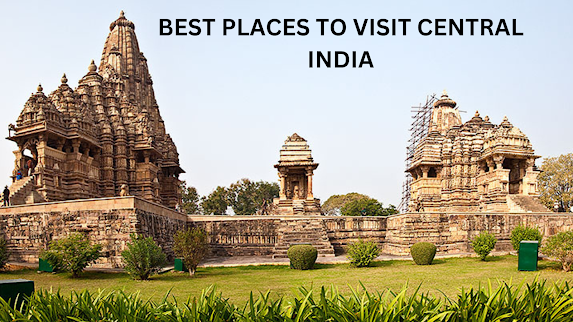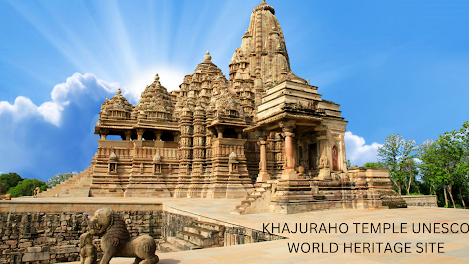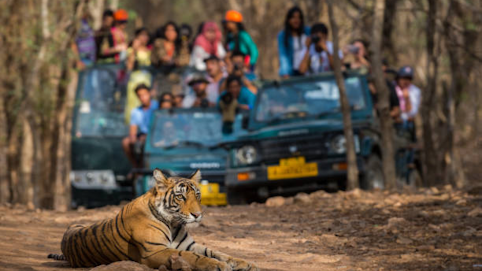Experiences abound in Central India, a vast and diverse region just waiting to be discovered with our central India tour packages only with tempo travellers rentals in Delhi. Facility. This enchanting site is a symbol of natural beauty, culture, and history and is tucked away in the geographic centre of the Indian subcontinent. To put it simply, the heart of India is a lovely and enchanting place that is home to great forts and old temples, surrounded by the most vibrant and historic towns in the nation and alive with animals in the forests and jungles.
It is the home
of both old customs and modernization, as well as the natural world and
cultural riches. Central India has a lot to offer tourists, whether they are
history buffs, thrill seekers, or just lovers of the great outdoors. The most
popular tourist routes across Central India along the Narmada River can lead to
the heart of India. This region is home to numerous historical landmarks, a
range of national parks, and a rural way of life.
Khajuraho
Temples
Bandhavgarh
National Park
Sanchi Stupa
Gwalior
Fort
Bhimbetka
Caves
Ujjain
Kanha National Park
Also, Check Out: Luxury India Tour Packages
1) Khajuraho Temple:
Renowned for
its historic temples that date back to the Chandela dynasty and were
constructed between the ninth and the twelfth centuries, Khajuraho
is a UNESCO World Heritage site. The temples exhibit a singular fusion of
artistic and religious expression and are renowned for their elaborate and
magnificent sexual sculptures.
This historical site boasts three
groups of temples: The Western Group, Eastern Group, and Southern Group. The
Western Group, the main attraction, features iconic temples like Kandariya
Mahadev, Duladeo, and Chitragupta. These temples, dedicated to Hindu deities,
display exceptional architectural and sculptural details, depicting scenes from
daily life, mythology, and spiritual teachings. While exploring Khajuraho,
visitors witness the remarkable craftsmanship of the Lakshmana Temple, the
sensuous depictions at the Devi Jagadambi Temple, and the tranquil surroundings
of the Vishvanatha Temple.
Khajuraho, a UNESCO World Heritage
site, offers a wealth of sightseeing activities, inviting visitors to explore
its rich cultural and historical heritage.
Here are some must-visit attractions and activities in Khajuraho:
Western
Group of Temples
Light and
Sound Show
Eastern
Group of Temples
Southern
Group of Temples
Matangeshwar
Temple
Archaeological
Museum
Ayurvedic
Massage
Panna
National Park
Local
Markets
Raneh Falls
2) Bandhavgarh
National Park:
Tucked away
in the central region of Madhya Pradesh, Bandhavgarh National Park is home
to a flourishing Bengal tiger population and serves as a monument to India's
abundant biodiversity. The park's vast terrain, which includes green meadows,
old forts, and dense forests, provides a lovely setting for those who enjoy the
outdoors and wildlife.
Famous
Sightseeing Spots in Bandhavgarh:
Tala Zone
Bandhavgarh
Fort
Bamera Dam
Shesh Shaiya
Climber's
Point
Three Cave
Point
Juhila Poo
Chakradhara
Meadow
3) Sanchi Stupa:
Sanchi Stupa stands as an enduring
testament to India's rich Buddhist legacy. Commissioned by Emperor Ashoka in
the 3rd century BCE, this UNESCO World Heritage site is a symbol of peace,
spirituality, and architectural brilliance. The site is renowned for its
well-preserved stupas, monasteries, pillars, and gateways, collectively
narrating the story of Buddhism's early spread in India. Visiting Sanchi Stupa
is a journey back in time, where the spiritual ambience, ancient architecture,
and profound historical significance converge to create an enriching
experience.
Famous
Sightseeing Spots in Sanchi Stupa:
The Great
Stupa
Ashoka
Pillar
Eastern
Gateway
The Buddhist
Vihara
The Gupta
Temple
Sanchi
Museum
4) Gwalior
Fort:
Gwalior Fort, situated a top a
sandstone hill in the city of Gwalior, Madhya Pradesh, boasts a rich and storied history that spans
over a thousand years. This formidable fortress has witnessed the rise and fall
of several dynasties, leaving an indelible mark on the cultural and
architectural heritage of India. The origins of Gwalior Fort can be traced back
to the 8th century when it was founded by Suraj Sen, a local chieftain. Over
the centuries, the fort passed through the hands of various rulers, including
the Tomars, Mughals, Marathas, and the Scindias. Today, Gwalior Fort stands as
a testament to the resilience of Indian history and architecture. The fort's
structures, including the Man Singh Palace, Saas Bahu Temples, and Teli Ka
Mandir, showcase the artistic and cultural influences of the diverse rulers who
held sway over this historic stronghold. Designated as a UNESCO World Heritage
site, Gwalior Fort continues to attract visitors with its architectural
splendour and echoes of a bygone era.
Famous Sightseeing
Spots in Gwalior Fort:
Man Singh
Palace
Gujari
Mahal
Saas Bahu
Temples
Teli Ka
Mandir
Jai Vilas
Palace
Gwalior Fort
Light and Sound Show
Gwalior Fort
Viewpoint
5) Bhimbetka Caves:
The Bhimbetka Caves, located in the
state of Madhya Pradesh, India, constitute an archaeological treasure trove
that unfolds the rich tapestry of human history. Designated as a UNESCO World
Heritage site, these rock shelters are nestled in the Vindhya Range and provide
a fascinating glimpse into prehistoric life. One of the unique aspects of
Bhimbetka Caves is the coexistence of different cultural phases over the
millennia. The site served as a shelter for various prehistoric communities,
showcasing their artistic expressions over time. Bhimbetka Caves stand as a
testament to the enduring connection between humanity and its environment,
providing a remarkable visual archive of our prehistoric heritage. The site
continues to be a subject of ongoing research, contributing significantly to
our understanding of early human civilizations and their artistic expressions.
Famous
Sightseeing Spots in Bhimbetka Caves:
Auditorium
Cave
Zoo Rock
Boar Rock
Rat Rock
Trinity Cave
Reindeer
Rock
Female
Figure Cave
Hunting
Scenes
6) Ujjain:
Ujjain, one of the seven sacred
cities in Hinduism, is a city steeped in history, mythology, and spiritual
significance. Nestled on the banks of the Shipra River in the state of Madhya
Pradesh, India, Ujjain has been a centre of learning, trade, and religious
fervour for centuries. Ujjain's history dates back to ancient times, and it
finds mention in Hindu scriptures like the Vedas. Ujjain, with its amalgamation
of history, spirituality, and cultural heritage, continues to draw pilgrims,
scholars, and history enthusiasts from around the world, providing a timeless
connection to India's rich past.
Famous
Sightseeing Spots in Ujjain:
Mahakaleshwar
Jyotirlinga
Ram Ghat
Kaal Bhairav
Temple
Sandipani
Ashram
Vikram Kirti
Mandir
Harsiddhi
Temple
Bhartrihari
Caves
Observatory
(Vedh Shala)
Chintaman
Ganesh Temple
7) Kanha National
Park:
Kanha National Park, situated in the
central Indian state of Madhya Pradesh, boasts a rich history deeply
intertwined with wildlife conservation efforts in India. The lush sal and
bamboo forests, meadows, and water bodies within Kanha provide a diverse
habitat for a plethora of wildlife species, making it a crucial biodiversity
hotspot. The park's name is derived from the Kanha River, which meanders
through its core area, enhancing its ecological significance. Over the years,
Kanha National Park has played a pivotal role in the successful conservation of
the Bengal tiger. The park's tiger population, along with other charismatic
species like the barasingha (hard-ground swamp deer), has witnessed positive
growth, marking a notable achievement in India's wildlife conservation
narrative. Kanha National Park stands as a shining example of successful
conservation practices, showcasing the delicate balance between preserving
natural ecosystems and fostering sustainable tourism.
Famous
Sightseeing Spots in Kanha National Park:
Kanha
Meadows
Bamni Dadar
(Sunset Point)
Kanha Museum
Sarhi Zone
Shravan Tal
Kisli Zone
Elephant Safari
Kanha Tiger
Reserve Buffer Zone
Other Related Blogs to know:
Central India, with its diverse
landscapes, rich cultural heritage, and flourishing biodiversity, weaves a captivating
narrative that resonates through its historical monuments, vibrant traditions,
and untamed wilderness. As we traverse the heartland of the country, a profound
tapestry unfolds, revealing the essence of India's identity and the resilience
of its natural and cultural treasures.











No comments:
Post a Comment